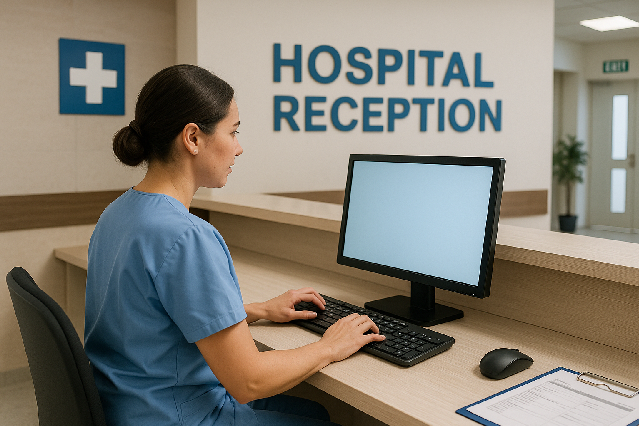
How Healthcare Software Development Improve Patient Care and Operational Efficiency
From the very first contact with the patient and their records and all the way up until post-discharge care, everything is integrated with software in today’s healthcare industry. Not even the fastest growing digital health startups can overlook the importance of custom healthcare software because for them, it is no longer merely a technological tool.
Custom software has become a critical component of operational infrastructure within healthcare organizations. It enhances data storage, accelerates decision processes, improves prognosis, and most importantly enables the delivery of highly personalized medical attention care that was impossible a decade ago.
Modern day physicians do not solely trust their years of training and instinct; a great deal of it is now complemented by clinical decision support systems, AI diagnostic tools, and EHRs which track blood pressure, allergies, and everything in between. This is precisely what differentiates modern software from merely a back-office tool; it is integrated into the daily life saving operations and healthcare outcome management.
Table of Content
- 1 How Custom Software Cuts Through Operational Chaos
- 2 The Role of EHRs in Precision Medicine
- 3 Telemedicine Platforms Bring Healthcare to the Doorstep
- 4 How AI and ML Makes Healthcare Proactive, Not Reactive
- 5 Workflow Automation Reduces Burnout and Boosts Focus
- 6 What to Look for in a Healthcare Software Partner
- 7 Final Thoughts: Healthcare Software Isn’t Optional Anymore
- 8 FAQs
How Custom Software Cuts Through Operational Chaos
Imagine that a hospital’s OPD section has fallen behind schedule. Nurses cannot locate the required lab results. Billing conflicts are holding up discharges. None of this staff inefficiency happens simply because an organization fails to train its people.
It all comes down to disconnected systems. That’s where custom healthcare software solutions become handy. Organizations no longer have to rely on shoddy Excel spreadsheets worked on manually. Now, they are investing in integrated systems that encompass every stakeholder: patients, doctors, labs, pharmacies, and even administrators.
Consider the case of an appointment booking system. AI-backed smart scheduling systems can now automate doctor slot bookings, reduce patient wait times, and send necessary reminders. The same principles can be applied to billing systems. If your EHR integrates with the billing platform, you eliminate manual entry, streamline insurance claim duplication, increase approvals, and improve overall pricing transparency.
The Role of EHRs in Precision Medicine
The development of EHRs was to ease the burden of paperwork for medical practitioners by allowing them to digitize charts into files. In 2025, EHRs have transformed to become real-time health systems. Patient data must now be analyzed rather than just stored. The shift is from data storage to data intelligence. It’s easy to access a patient’s history, multi-faceted chronic issues, track medication responses over long periods, and receive predictive analyses on possible future complications.
When EHRs come with pay-per-performance interfaces, dashboard customizable automation, alerts, and lab results, physicians make quicker, more accurate decisions without the vexation of file retrieval. It is no longer about alleviating the amount of paperwork. The focus has shifted towards increasing patient care outcomes.
Telemedicine Platforms Bring Healthcare to the Doorstep
No discussion about healthcare software is complete without mentioning telemedicine integration. In 2019, this technology was almost nonexistent, but the pandemic accelerated its adoption, making it the primary method of consultation. Now, it forms an integral component of the healthcare ecosystem. The catch is that only those telemedicine solutions which integrate well with the EHRs, diagnostics, and payment systems actually work.
A standalone video call platform simply won’t be effective. Patients find value in a software suite that allows physicians to view reports in real time and seamlessly upload prescriptions post-consultation, triggering automatic processing at the pharmacy. Clinics appreciate the efficiency at scale. Moreover, the standard, or even enhanced, quality of care relative to OPD visits is maintained.
How AI and ML Makes Healthcare Proactive, Not Reactive
Healthcare has always been reactive, treat the illness once symptoms appear. This paradigm is changing with AI and machine learning. Predictive analytics in healthcare is no longer a buzzword. Assisting platforms are now capable of flagging high-risk patients before emergencies, suggesting preventive screenings based on identified patterns, and even allowing mental health platforms to detect early signs of depression through behavioral inputs.
While doctors are not replaced by AI tools, they are now equipped with a form of technology that provides them with auxiliary support. The procedure for diagnosing cancer which would typically span several weeks, can now be completed in just a few hours. In an ICU unit, the risk of an infection can be flagged even before any visible symptoms appear. Being able to anticipate clinical events is the next evolution in patients’ look-after, and this approach is completely software-based.
Workflow Automation Reduces Burnout and Boosts Focus
If you converse with a nurse or hospital administrator regarding their major complaint, they are likely to tell you – “We’re doing more paperwork than patient work.” Healthcare workflow automation addresses this challenge, and is a true game-changer.
Whether it’s providing automated discharge summaries, real-time updates on bed availability, or filling lab test orders automatically, any process that eliminates manual repetition enhances form flow ratio for healthcare personnel. This enables staff to devote appropriate time to caring for people rather than being stuck with forms.
The impact here is far beyond saving time. Exhaustion among healthcare workers is an equally grave challenge. Intelligent administrative burden reduction software systems go beyond improved operational effectiveness; they help maintain the mental wellbeing of caregivers. It is a win-win situation when your doctors and nurses are feeling supported by technology instead of feeling stressed out due to increased workloads.
What to Look for in a Healthcare Software Partner
In these cases, if you are contemplating healthcare software development, don’t just hire a tech company. Search for a company that has deep knowledge of the healthcare sector.
Look for partners who build with compliance, scalability, and user experience in mind. Most critically, choose developers who understand your software is not merely a product, but a device designed to enable lifesaving activities and operational streamlining.
Domain expertise, focus on interoperability, and agile development that lets you tweak modules as your healthcare needs evolve are all top considerations. It doesn’t matter if it’s a hospital information system (HIS), a patient portal, or a remote monitoring app; all development processes must be centered around the workflows, not the other way around. For tailored development services, visit https://svitla.com/industry/healthcare-software-development-services/
Final Thoughts: Healthcare Software Isn’t Optional Anymore
Here’s the reality: healthcare software is no longer a “nice-to-have” innovation. It is now your best opportunity for delivering quality care at scale while containing costs. From better diagnoses to fast-tracked discharges; remote care to secure data management, the entire healthcare continuum is becoming digital and smarter. The right software is not an investment, it is the most dedicated ally in the journey towards a healthier future.
FAQs
What is healthcare software development?
This is the process of creating software that enhances a patient’s experience, a hospital’s operational processes, and the complex systems of medical data management.
How does healthcare software help doctors?
Physicians are provided with updated patient records, relevant diagnostic aids, and supplementary alerts which streamline his decision-making processes.
Is custom healthcare software secure?
Yes, it includes strong security features like encryption and access control to protect patient data.


